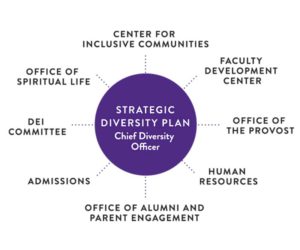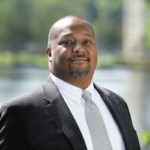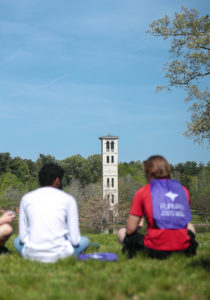BEGIN WITH BELONGING
Members of the Class of 2025 get to know
one another during Summer Orientation in June 2021.
BEGIN WITH BELONGING
What does it mean to create education that transforms, to build connections that endure and to support communities that flourish?
And how do we pursue these ideals? Our new Strategic Diversity Plan lays out our common goals and objectives and expresses our approach to the concept of inclusive excellence.
Inclusive excellence is a framework that supports the integration of diversity, equity and inclusion into the core functions and operations of the university. Inclusive excellence advances The Furman Advantage by institutionalizing educational equity and reflecting an explicit understanding that diversity, equity and inclusion are not isolated initiatives but rather catalysts for institutional and educational excellence.
- We acknowledge that we must be truly inclusive to be truly excellent.
- We aspire to promote meaningful communication, strong support and shared experiences among people of different identities and life experiences.
- We act to remove obstacles to attaining diversity, equity and inclusiveness in the recruitment, retention and advancement of students, faculty and staff from underrepresented groups.
- We foster in our students a sense of social justice and encourage them to exercise their civic responsibility in creating a fair and equitable order.
Alongside our new Strategic Diversity Plan, this year also brought new Mission, Vision and Values Statements and an expanded institutional history that provides a more complete telling of Furman’s story. This updated history credits the contributions of enslaved people and acknowledges the historic racism of members of the Furman family.
The plan corresponds with a related conversation, one in which the Ad Hoc Committee on Black Life at Furman presented a comprehensive report to President Elizabeth Davis. The report recommended ways to advance strategies and actions related to the university’s commitment to anti-racism, diversity, equity and inclusion.
Lillian Brock Flemming ’71 M ’75 H ’14 (left), one of Furman’s first African American students, and family friend Kayla Randolph stand with the Joseph Vaughn ’68 statue during the unveiling in April 2021.
A number of steps have already been put into motion, including
- the creation of the Black Alumni Council,
- changes to Furman’s website to provide more information on diversity, equity and inclusion
- the completion of a proposal for a major in Africana studies, and
- a revamping of our bias incident response system.
Since launching The Furman Advantage in 2016, Furman has adapted its critical analysis of the student experience to better deliver on its promise, positioning Furman at the forefront of universities that are focused on student belonging. Our strategic vision aligns community engagement with a knowledge of privilege. This allows our students to build coalitions that seek to propel equitable social change across race, socioeconomics, political affiliation, religion, ability, sexuality, regionalism, gender identity and more.
To advance this, Furman secured a $150,000 grant from The Hearst Foundation to help increase historically underrepresented students’ participation in programming and experiences offered through The Furman Advantage. Hearst Fellows have access to all of Furman’s premier programs, but with additional mentoring and financial support.
At the heart of this mission is the Center for Inclusive Communities, which supports the immediate and long-term success of Furman’s historically underrepresented students. Using current research on belonging, well-being and career engagement, the center helps prepare Furman students to appreciate difference and to make a lasting positive contribution in their post-graduation life.
To move us forward …
- The Office of Spiritual Life developed on-campus, mentored internships for the Exploration of Vocation and Ministry program. The campus cohorts included groups who studied and developed programming in the areas of pastoral care, racial justice and faith and politics.
- Furman will host its first LGBTQ+Homecoming tent in October, connecting alumni with current faculty, staff and students.
- The Black Alumni Council was officially recognized as one of the university’s premier volunteer leadership groups. The council’s representatives work to increase engagement with Black alumni, support the undergraduate experience for Furman’s Black students, participate in meaningful dialogue with university leadership, and oversee the activities of the Black Alumni Association.


“When new students come on campus, I hope they feel included, and I hope they have a sense of belonging to a university community that wants to embrace them and support them in every way possible.”
MICHAEL JENNINGS, professor of education, who served as chief diversity officer from 2017 to 2021
“A majority of one” is how Joseph Vaughn ’68, Furman’s first Black undergraduate student, described his experience, which led to the university’s desegregation. In April, with the unveiling of a statue of Vaughn, we further refined our self-image by making clear who we are and what we value.
Community members gathered virtually and on campus to celebrate and reflect on Vaughn’s legacy, the power of the statue –which welcomes all to campus the way Vaughn the man once did –and the completion of the plaza bearing his name. This latest evolution of the campus landscape is among the recommendations of Furman’s Task Force on Slavery and Justice, which was formed in the spring of 2017 with the support of the president and provost.
That decision and the ensuing “Seeking Abraham” report brought to life Furman’s principles as an institution, which embody the ideals of liberal arts and sciences, including a high regard for human value, reflection, innovation and relentless accuracy. Students, faculty, staff and alumni from across academic departments and experiences contributed to the report. In a less visible but still deeply held commitment to recognizing the past and present harms of racism, we created a university holiday for Juneteenth after U.S. President Joe Biden signed legislation making it a federal holiday.

“I’m a tactile learner. I prefer when I can get my hands on a Braille copy, just because I retain information better and understand it more.”
FATIMA QUINTANA ’24
Four offices across campus worked together to design and build a 3D Braille model of a course concept for her sustainability sciences class.

Students take a study break across from the Furman Bell Tower.
After five years of pursuing an open-rank strategy for faculty hires, the fall 2021 class of new faculty is the most diverse in Furman’s history. This representation matters because students, faculty and staff should see themselves reflected in the faculty, and students of diverse backgrounds should have a community of mentors who model academic leadership but also embody the full range of lived experiences, backgrounds and identities that exist in our society.
What else can be done to create an institution steeped in the culture of belonging? The Faculty Development Center plays a powerful role.
- As a part of the “Summer 2020 Vision” series for online and hybrid learning, the center held course-and research-redesign planning modules to facilitate supportive, accessible learning communities across online, hybrid and in-person formats. Partnering with the university’s IT department, the center provided teaching demonstrations to help faculty maximize new classroom technology during the pandemic.
The purpose of it all? To ensure that no matter how students participated, where they joined from, or what constraints they may have had, they were included and supported as a part of a learning community set up for their success.
- The Faculty Development Center also offered programming focused on inclusive pedagogy and dialogue across interpersonal differences. Workshops dealt with building inclusive and anti-racist syllabi and helped individual departments review their curriculum and courses to ensure equitable access and learning outcomes.
- The center also designed a new initiative called Talking Teaching, aligned with the book,“Bandwidth Recovery,” focused on recovering the cognitive resources that underrepresented students lose to poverty, racism and social marginalization.
- The center partnered with five peer institutions to receive a CREATE grant (Conversation-Rich Education for Anti-Racist Teaching/Learning Environments) from the Associated Colleges of the South to launch a peer-to-peer conversation initiative among faculty and staff about race, diversity, equity and inclusion.
In all, the goal of these efforts is to help facilitate transformative learning experiences where diverse individuals can come together to develop a shared sense of belonging and purpose.
during the Joseph Vaughn ’68 statue unveiling.
WITH
BELONGING